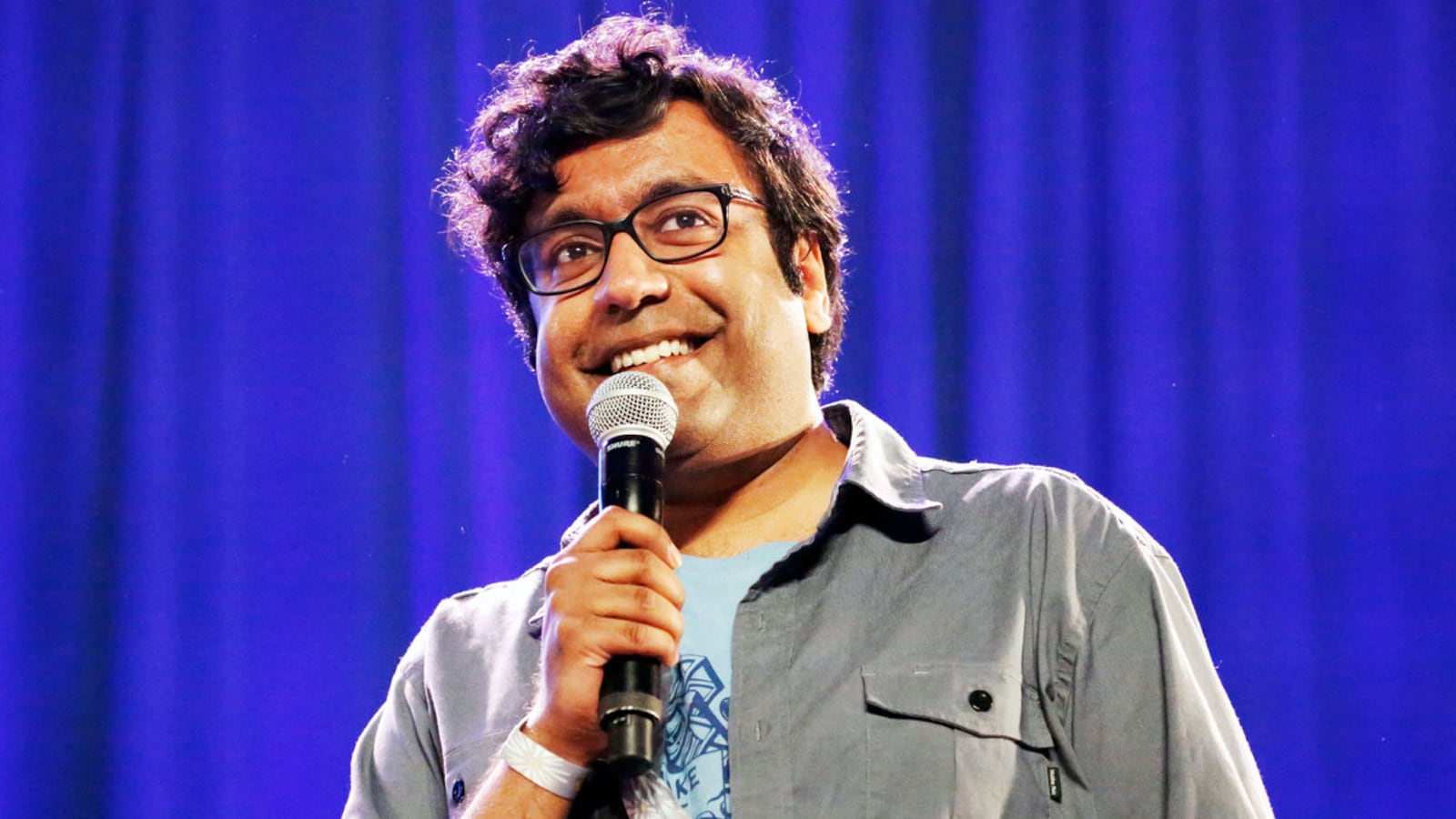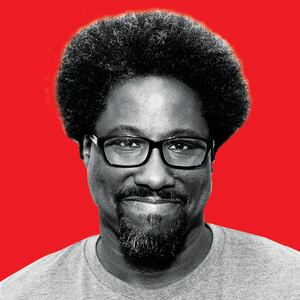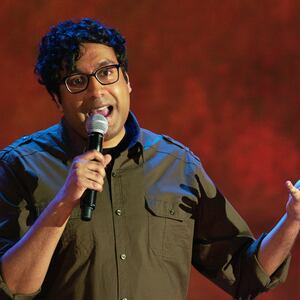Comedian Hari Kondabolu has been riding out the pandemic in sunny San Diego, California, after becoming a father for the first time this summer. He’s waiting until after the election to move his family back to Brooklyn.
“Hopefully New York will still be standing post-election regardless of what happens,” he tells me on this week’s episode of The Last Laugh podcast. “We’ve worried about that. Will the civil unrest make it impossible to move into a two bedroom in Park Slope?”
As a “touring stand-up comic who can’t tour” with a newborn son at home, Kondabolu says that he has been having the “most unexpected, strange, amazing year.” There are moments when he thinks it “must have been fate or a stroke of good luck” that forced him to be off the road during this time, but then he stops himself. “Wait a second, hundreds of thousands of people have died,” he adds. “If fate is like, we gotta make sure he has time with his baby—at the expense of hundreds of thousands of people—then fate is fucked up.”
Kondabolu, who is perhaps most famous for starring in the 2017 documentary The Problem With Apu, is not ready to start putting audiences at risk to perform live and decided pretty quickly that Zoom stand-up shows are not for him. “I feel like I’m being the funny guy on the work conference call and I don’t want that,” he jokes.
That’s part of the reason why he has decided to reunite with his old friend—and former Last Laugh guest—W. Kamau Bell for a brand new season of their podcast, Politically Re-Active.
Launched in the summer of 2016, the pair initially planned to host the podcast through that fall’s election. They only did a second season the following year because Donald Trump won and their fans demanded a reaction. Now, they’re back once again by popular demand and holding nothing back at this increasingly fraught political moment.
After the last presidential election, Kondabolu tells me he doesn’t believe the positive poll numbers for Joe Biden and is generally terrified that Trump will somehow win a second term.
“The fact that this man has not been imprisoned or at the bare minimum found guilty after being impeached is an indication that the system is severely broken,” he says of Trump. “He’s invincible as far as I’m concerned. There’s nothing he can do at this point that will get him into trouble because he has all this support. I mean, with these Republicans, Caligula would have gotten another term. There is absolutely no sense of moral obligation.”
Even contracting COVID-19 seems to have done nothing to slow the president down. “He’s a Teflon Don, man,” Kondabolu says. “That dude is on his balcony Mussolini-style without a mask, and it’s fine?”
Over the course of our lively conversation, Hari shares more of his views about the 2020 election, looks back on the sometimes awkward beginnings of his comedy career and responds to the reckoning in animation that has seen a slew of white actors step down from voicing characters of color—including The Simpsons’ Hank Azaria.
Highlights from our conversation are below and you can listen to the whole thing right now by subscribing to The Last Laugh on Apple Podcasts or wherever you listen to podcasts.
Why he thinks the concept of ‘undecided voters’ is a ‘crock of shit’
“The idea of undecided voters to me is such a crock of shit. It’s either people who won’t tell you they’re voting for Trump because they’re embarrassed, but they’re going to do it anyway. Or they are people that are so—I mean, this is not probably the nicest thing to say, but maybe some people shouldn’t be allowed to vote. If you are undecided a month out, after four years? What needed to happen short of ‘Donald Trump came to my house and killed my family?’ Oh, you’re ‘leaning towards Biden’ now? At what point has he done enough?”
How Margaret Cho made him want to pursue comedy
“There was nobody like her. And there certainly was nobody like me. So much of art when you’re a person of color, especially when you’re growing up, is trying to relate to the white American experience. That’s what makes it so painful when people say, ‘This isn’t going to be relatable to a Midwestern audience.’ That means they’re unwilling to try to see their shared humanity with us. And that sucks because if you are not in the majority in this country, then you actively have to work to find that commonality. You don’t have the privilege not to. Margaret Cho, as the child of immigrants—like me, being the first-generation, born in this country—this is someone who’s like me. And she says what she wants. And she commands an audience and people pay attention to her. As someone with immigrant parents, as someone who grew up in a diverse setting, as someone who was bridging those different cultures at the same time, it was the closest thing I had to my experience. So it planted a seed of maybe I could do this.”
On the wave of white actors who have stopped voicing animated characters of color
“I mean, first I’ll say that it really upsets me that it takes the brutal murder of a Black man in Minneapolis to change animation. That’s what it takes? Really? These are decisions that should have been made years ago. And it also tells me, all these years, people complain about all these activist groups and they just keep complaining over everything and then eventually you find out, oh, they were right. And people are finally like, yeah, that is true. When you stand up for anything, you’re going to get beaten down for it if it’s not the popular point of view.”
Why he felt so insulted by how ‘The Simpsons’ responded to his documentary ‘The Problem With Apu’
“I was a fan until probably that moment. Honestly, the thing they did with Lisa Simpson in March? If there was a shark to be jumped, you’ve jumped it. The only thing that was missing was the phrase, ‘Fuck you, Hari Kondabolu.’ When they look into the camera, it feels like they’re looking at me. I mean the whole idea of an episode about political correctness already makes The Simpsons look so old. Secondly, throwing Lisa into it—Lisa’s a fucking social justice warrior! She was a social justice warrior and killjoy before we had the terminology. That’s who she is. So to use her character to deliver that message just shows you the show has lost something also. When did you become the status quo? When did you no longer become part of counterculture? And it also said a lot about white fragility. I wasn’t trying to troll them, but it felt like I did. They’re not supposed to respond to me. That’s an indication that you couldn’t handle the criticism. And it didn’t matter what the criticism was, you felt guilty, you felt bad, you felt annoyed that somebody questioned you. You felt that everyone’s too sensitive. It’s really kinda shitty.”
On Hank Azaria deciding to stop voicing Apu on ‘The Simpsons’
“What’s more important to me is that it led to Hank Azaria going on his own personal journey and talking about race. He’s actually grown as a human being. And the thing is what happened with Hank is kind of what I wanted to happen with the larger conversation that the film is sparking. And apparently the only guy that did was Hank Azaria! So many people didn’t watch it and hated it. And Hank actually did the work, which is exactly what you’re supposed to do. When I heard people say, I really hated your documentary until I watched it, I mean, that says everything.”
Next week on The Last Laugh podcast: ‘Daily Show’ contributor Jordan Klepper returns to talk about trolling Trump rallies.



